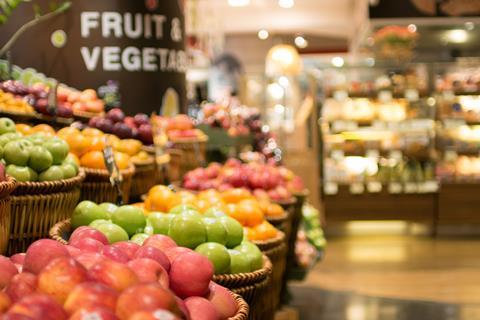UK supermarkets should be banned from selling fresh produce such as apples, tomatoes and bananas in primary packaging, says anti-waste charity

Wrap has recommended that the government consider banning packaging on a number of fruits and vegetables sold at UK retailers by 2030.
The organisation is calling for a phased approach, starting with banning packaging on 21 products already identified in its research.
The ban – which would be highly controversial in the fresh produce industry – would be on primary packaging for whole, uncut fresh produce items sold in amounts less than 1.5kg.
The 21 initial products are: apples, aubergines, avocados, bananas, broccoli, cabbages, carrots, garlic, ginger, lemons, limes, mangoes, onions, oranges, parsnips, pears, peppers, potatoes, salad tomatoes, squash, and swede.
After considering other options – such as new taxes or subsidies – Wrap says a government ban would be the most effective approach to reduce high volumes of plastic packaging and food waste.
However, there are strong arguments for plastic packaging significantly extending the shelf life of various fresh produce, thereby reducing food waste.
A packaging ban could also limit the total volume of produce that shoppers buy and limit opportunities for point-of-sale branding and marketing. More industry reaction to follow.
Other countries, such as France, have already passed laws banning packaging on many fresh products. And in March, the EU reached a provisional agreement to ban a number of different single-use plastic packaging formats, including packaging for unprocessed fresh fruit and vegetables, from 1 January 2030.
Wrap says the first phase of its plan should be in force by 2030, to align with the EU’s Packaging and Packaging Waste Regulation (PPWR) timeframes.
The organisation believes the ban would encourage people to buy closer to their needs, reducing household food waste and single use packaging, and saving the associated carbon emissions.
The recommendation is for a total packaging ban, not just a plastics ban, since all materials have an environmental impact. It argues that this will reduce food waste by forcing people to buy closer to their needs.
In the UK, 70 per cent of all edible post farm-gate food waste comes from people’s homes, with fresh fruit and vegetables accounting for the largest proportion.
Meanwhile, the organisation says majority of fresh fruit and vegetables are packed using single-use plastic (around 70,000 tonnes a year).
Wrap has been working with industry to increase the amount of fresh produce sold loose through its Pathway to Selling More Uncut Fresh Fruit and Vegetables Loose, aiming for 50 per cent of uncut fruit and veg sales volume to be loose by 2030.
However, Wrap and industry partners from Courtauld 2030 and the UK Plastics Pact have identified several challenges associated with transitioning to a mostly loose system for fresh fruit and veg.
Policy interventions have been raised as an important requirement for creating a level playing field. To maximise the impact of the policy intervention, Wrap says there should be a formal consultation and an economic assessment of the impact of any ban.



